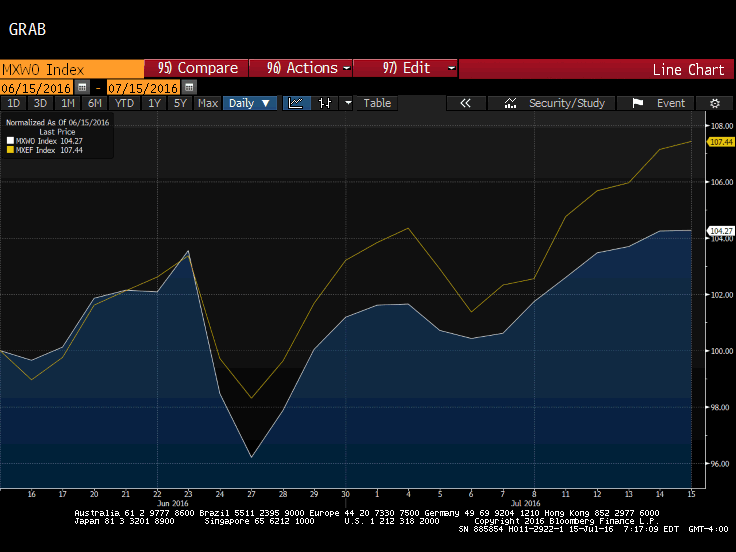
Since the UK voted to leave the EU, emerging market equities have outperformed equities from the developed markets.This Great Graphic, composed on Bloomberg, shows the MSCI Emerging Market equities (yellow line) and the MSCI World Index of developed equities (white line).
Both time series are indexed as to June 15, but they were at nearly identical levels as the UK voted.The developed market equities fell more than emerging markets.The UK and Japanese stocks were particularly hit, and the drop in yields saw financial stocks get crushed.
The decline in yields and the likely policy response in the UK, Japan, and possibly the ECB, encouraged flows into emerging markets. The BOE did change policy yesterday, though it did reduce the required capital buffer for UK banks.The BOE is widely expected to ease policy–not limited to a 25 bp rate cut– next month.Speculation has surfaced this week, after the Japan’s upper house election, of aggressive monetary and fiscal action (helicopter money?).
The decline in European interest rates, and German rates, in particular, means that fewer German bunds are available to be purchased under the ECB’s asset buying program. Some are speculating (though we are skeptical) that the ECB could move away from the capital key (driven by population and GDP) toward a debt key, which would be seen as easing policy in the sense of purchasing lower quality assets.
In the first half of July, foreign inflows into South Korean and Taiwanese equities have been particularly strong. Foreign investors bought $1.86 of South Korean equities here in July. This is equivalent to 35% of their year-to-date purchases.Foreign investors bought $2.02 bln of Taiwanese shares in the first half of the July, which is about 25% the inflows this year.
Although the dollar amounts are considerably smaller (as are the markets), but the foreign demand for Philippines and Thailand equities has been proportionally just as strong.Here is July, foreigners bought 29% of the Philippines stock that they have bought all year.In Thailand, the figure is closer to 37%.









Leave A Comment